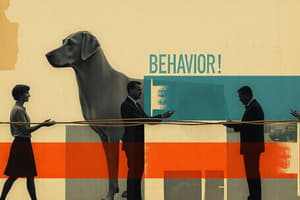Podcast
Questions and Answers
What is an antecedent stimulus class?
What is an antecedent stimulus class?
- A type of stimulus-to-stimulus relation.
- A set of stimuli that share a common relationship. (correct)
- Stimuli that evoke different responses.
- Stimuli that do not evoke any behavior.
What defines an arbitrary stimulus class?
What defines an arbitrary stimulus class?
- Antecedent stimuli that evoke the same response without resembling each other. (correct)
- A specific type of response to reinforcement.
- Stimuli that evoke similar responses and look alike.
- Stimuli that share physical forms.
What is concept formation?
What is concept formation?
A complex example of stimulus control requiring generalization within a class and discrimination between classes.
What is the role of a discriminative stimulus?
What is the role of a discriminative stimulus?
What defines a feature stimulus class?
What defines a feature stimulus class?
What is matching-to-sample?
What is matching-to-sample?
What does reflexivity refer to in stimulus relations?
What does reflexivity refer to in stimulus relations?
What is stimulus control?
What is stimulus control?
What is a stimulus delta?
What is a stimulus delta?
What does stimulus discrimination training involve?
What does stimulus discrimination training involve?
What is stimulus equivalence?
What is stimulus equivalence?
What does stimulus generalization mean?
What does stimulus generalization mean?
What is a stimulus generalization gradient?
What is a stimulus generalization gradient?
What does symmetry in stimulus relations refer to?
What does symmetry in stimulus relations refer to?
What does transitivity imply in stimulus-stimulus relations?
What does transitivity imply in stimulus-stimulus relations?
Flashcards are hidden until you start studying
Study Notes
Key Concepts in Stimulus Classes and Control
-
Antecedent Stimulus Class: A group of stimuli that share an inherent relationship, all causing the same operant or respondent behavior.
-
Arbitrary Stimulus Class: A collection of antecedent stimuli that evoke identical responses but lack physical resemblance or relational aspects, e.g., different food items evoking "sources of protein."
-
Concept Formation: Involves complex stimulus control requiring both generalization within stimulus classes and discrimination between different classes.
-
Discriminative Stimulus (SD): A specific stimulus where particular responses have been reinforced, leading to behavior that is context-dependent.
-
Feature Stimulus Class: Stimuli that have similar physical attributes or relative relationships, such as shape, size, or color.
-
Matching-to-Sample: A procedure to study conditional relations where participants match a sample stimulus to comparison stimuli, reinforcing matches but not non-matches.
-
Reflexivity: A stimulus-to-stimulus relation where a learner can match a stimulus to itself without prior training, exemplified by A = A.
-
Stimulus Control: Occurs when the presence or absence of an antecedent stimulus affects the frequency, timing, or intensity of a behavior.
-
Stimulus Delta (SΔ): A stimulus where a specific behavior has historically not led to reinforcement.
-
Stimulus Discrimination Training: Involves training a behavior under two different antecedent conditions, reinforcing responses in the presence of one condition (SD) while not reinforcing in another (SΔ).
-
Stimulus Equivalence: The ability to respond accurately to untrained stimulus relations after training on specific relations, demonstrated through reflexivity, symmetry, and transitivity.
-
Stimulus Generalization: Occurs when behaviors evoked in response to a stimuli extend to other stimuli that share similar properties.
-
Stimulus Generalization Gradient: A visual representation illustrating how behavior reinforced in the presence of a specific stimulus is shown in the presence of various other stimuli, highlighting levels of generalization and discrimination through slope variations.
-
Symmetry: A stimulus-to-stimulus relation where the learner can reverse a match between stimuli, such that if A = B, then B = A, without prior training.
-
Transitivity: A relationship that emerges between stimuli based on trained relationships, allowing for the understanding of untrained connections, such as if A = B and B = C, then A = C.
Studying That Suits You
Use AI to generate personalized quizzes and flashcards to suit your learning preferences.




